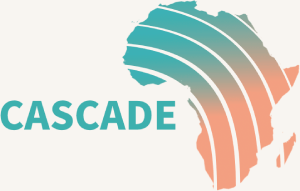Nov 26 2024
/
Insights from my CASCADE experience

The recent rise in natural disasters due to climate change affects every aspect of our lives – directly and indirectly. This demands a comprehensive and robust response to build resilience and conserve our well-being despite these volatile circumstances. In light of this, I feel immensely grateful to be a part of CASCADE, which, through its transdisciplinary research team, forms a bridge between the climate and social and health sciences to address these pressing issues. I am a research assistant at CASCADE and am concurrently pursuing a Master’s degree in Public Health. Joining CASCADE has undoubtedly been an enriching experience.
“Learning the perspectives of climate-health aspects from people of different disciplines has greatly increased my understanding of the decision-making processes and gaps on a ‘city level’ concerning the prioritization and resolution of climate-health issues. The views of local communities are also presented in this discussion, making them even more insightful.”
I am enthusiastic about applying and sharing my medical, epidemiological, and biostatistical knowledge in CASCADE. I aim to assist in mapping out climate-health risk pathways and investigating the associations between climate change and health risks. My recent attendance of meetings within this space has brought to light that understanding climate risks and developing interventions that aim to reduce these risks are much more complex to implement in the ‘real world’. The barriers are multi-factorial and intricately related, ranging from the commonly known funding challenges to perplexing social factors such as community perceptions and behaviours. The identification and modification of these barriers are critical for the development and implementation of effective climate-health interventions.
In addition, my understanding of learning labs has shown me the importance of the co-creation and sharing of knowledge. Learning labs are unique and transdisciplinary-focused spaces of discussion on key topics, which include various stakeholders. Learning the perspectives of climate-health aspects from people of different disciplines has greatly increased my understanding of the decision-making processes and gaps on a ‘city level’ concerning the prioritization and resolution of climate-health issues. The views of local communities are also presented in this discussion, making them even more insightful. The result of these learning labs is thus a holistic and comprehensive body of knowledge that can inform climate-health research and relevant policy-making procedures.
I look forward to collaborating with experts from these various backgrounds to develop my knowledge and skills. I also aim to increase awareness of the impact of climate change within the health research space, which is often overlooked. I greatly value CASCADE’s focus on marginalized communities. These communities are disproportionately affected by such catastrophic events and, therefore, require more attention. Achieving health equity is thus a cornerstone of CASCADE and aligns with the values of being a public health researcher (like myself). Additionally, the warm and friendly atmosphere at The Climate System Analysis Group at UCT fosters an ideal balance between productivity and well-being, creating a conducive environment for meaningful work. I am delighted to be part of such a team and eagerly anticipate contributing to and witnessing the interesting discoveries and research outputs that CASCADE will achieve.
Author: Khadija Ally
